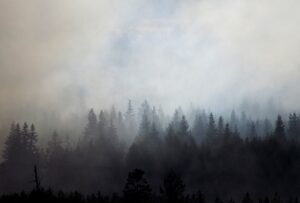The Haze of Sin
I am confined to quarters today. An air quality alert has been issued and it’s easy to see why. The air has an orange hue to it and breathing it in irritates the throat and eyes. There is even an acrid smell to it.
You might think that I’m close to some industrial accident, but I’m not. The fire that is causing people all over the Northeast to take cover is 1,000 miles away in Nova Scotia, where wildfires are raging.
It’s hard to believe that something so remote could make me wear a mask to walk to the end of my driveway to retrieve the newspaper, but there you have it. The wind currents are carrying these toxic effects far beyond their source.
Sin is like that, too. When we rationalize our own sin (and we all do), it’s often because we think we’re not harming anyone else, so why not? And even if we admit we might be harming ourselves, it’s our choice to make, isn’t it?
But sin is never so neat, so contained. It doesn’t respect the boundaries we’d think we’ve set for it. It seeps and it oozes through barriers that are more porous than we imagine. We underestimate its Houdini-like ability to escape and wreak havoc on our relationships, our community, our world. In subtle and not-so-subtle ways, our transgressions are like the haze outside my window: carried aloft into unexpected places, causing damage far beyond our expectations.
You might recall that in the wake of the scandal that marked his presidency, Bill Clinton spoke at the National Prayer Breakfast and recited Psalm 51. This beautiful prayer of confession and contrition addressed to God included this verse: “Against you, you alone have I sinned.”
But he was wrong. Whatever his personal sin, it didn’t remain personal. His sin was between him and God, true. But its effects went far beyond that. He damaged his family and his country. (By the way, so did King David, who wrote the Psalm.)
It’s tempting to measure our sins against the “worst” sins and shrug. Unlike King David, I haven’t committed adultery and then killed someone to cover it up. Unlike Bill Clinton, my sin hasn’t thrust the entire country into turmoil. But … every harsh word I utter disrespects someone God loves. Every time I indulge my pride, I drive a wedge between me and “them.” Every lie, no matter how trivial it may seem, corrodes trust.
Pornography is a good example of how “private” sin spreads. It has become a fact of modern life, readily accessible to anyone with a screen and a seemingly victimless activity. After all, who is it hurting? Isn’t it just between me and my computer screen? But research has shown the toll pornography is taking on (real) human relationships. And it is certainly not victimless. Many of the people who participate are trafficking victims. And so, the haze spreads far beyond one keyboard.
If you are chastened by all this, you might be tempted to white-knuckle it and vow to fight harder against sin in your life, to keep it contained. That might work for a while. But our only real hope lies outside of ourselves. As anyone who has struggled with deep-rooted destructive behavior knows, our best intentions and strongest willpower are no match for a force we cannot control.
We are not alone. St. Paul wrestles with this very thing in Romans chapter 7 (verses 18-25). Some excerpts:
“For I do not understand my own actions. For I do not do what I want, but I do the very thing that I hate.For I have the desire to do what is right, but not the ability to carry it out ….
For I do not do the good I want, but the evil I do not want is what I keep on doing…. Who will deliver me from this body of death? Thanks be to God through Jesus Christ our Lord.”
Like every question in every children’s sermon ever given, the answer is …Jesus! Jesus, who is not only our model, but our means of becoming more like Him. Jesus, our confessor and the one who offers absolution. Jesus who has delivered us from “this body of death” by his own death.
We will never be without sin, at least not in this life. But we can listen to the Holy Spirit when He reminds us that there is no such thing as a private sin. And we can contain the spread of sin’s noxious fumes by hastening to ask for forgiveness from God and those we have hurt. Thanks be to God.




